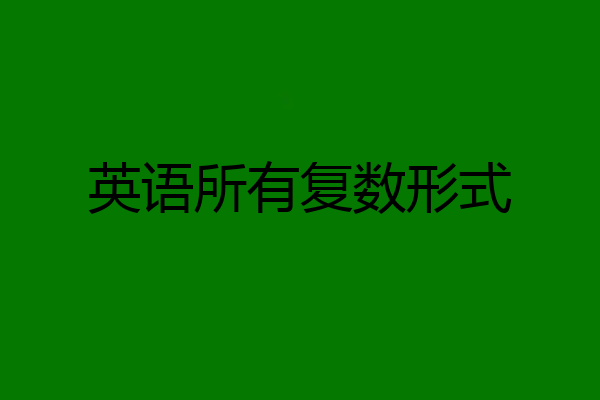
出格范儿
1.直接加s。2.以s,sh,ch,x结尾的单词要加es。3.以辅音字母加上y结尾的单词,去掉y加上ies.4.以o结尾的名词,变复数时,大多数都是直接加s,除了hero,negro,potato,tamato这四个加es.5.以f或fe结尾的名词变复数时,可以是加s,如:belief-beliefs,roof-roofs;也有去f,fe加ves,如half-halves,knife-knives,leaf-leaves,wolf-wolves,wife-wives,thief-thieves.此外。还有一些不规则变化。对于像man结尾的词:man→men一些以man,woman结尾的合成词,构成复数时与man的变化形式相同,如:policeman→policemen警察但是human(人),German(德国人)不是合成词,其复数不能仿man的变化规律,而是按规则变化,即用humans,Germans。另外,当man用于名词前作定语时,若其后被修饰的名词为复数,则man也要用复数:mannurse→mennurses男护士希望对你有帮助!


花花洒洒洒
名词的词形变化1.不规则复数形式1)来自古英语的复数形式,如:child---children foot---feet tooth---teeth goose---geeseman---men woman---women mouse---mice louse---liceox---oxen penny---pence analysis---analyses appendix---appendicesparenthesis---parentheses basis---bases ellipsis---ellipsesaxis---axes hypothesis---hypotheses oasis---oases crisis----crisescriterion---criteria phenomenon---phenomena datum---data medium---mediabacterium---bacteria nucleus---nuclei fungus---fungi stimulus---stimulialumnus---alumni focus---foci radius---radii terminus---terminilarva---larvae alga---algae formula---formulae#当代美国英语中往往把data当做单数用,因此常见到复数形式datas。另外,lens是一个单数可数名词,其复数形式为lenses。1)词尾读音为[f]并以-f或0-fe结尾的名词复数形式有以下几种情况: a)规则形式:belief---beliefs chief----chiefs cliff----cliffs grief----griefsb)不规则形式,即把-f或-fe变成-v,再加-es,读音为[vz]:calf---calves half---halves leaf----leaves life----livesloaf---loaves self---shelves thief---thieves wife---wiveswolf---wolvesc)既可是规则形式又可是不规则形式:dwarf---dwarfs/dwarves hoof---hoofs/hovesscarf---scarfs/scarves wharf---wharfs/wharves3)词干以-o结尾的名次有三种情况:a)附属形式为-s:这类词包括缩略词kilos,photos;表示国籍或民族的词Filipinos,Eskimos以及radios,solos,sopranos, studiosb)复数形式为-es,如:heroes,potatoes,tomatoes,Negroes。c)复数有规则的和不规则的两种形式,如:cargo---cargos/cargoes mosquito---mosquitos/mosquitoes volcano---volacbos/volcanoes2.单复数同形的名词 1)某些动物名词,如:deer,grouse,salmon,trout,carp,bison,sheep等2)以-ese或-ss结尾的表示民族或国籍的名词,如:Chinses,Japanese,Portuguese,Swiss,Vietnamese等3)某些以-s结尾的名词,如:barracks,corps,crossroads,gallows,headquarters,means,series,species,works等4)某些表示计量单位的名词,如:horsepower,hertz,kilohertz,li,mu等其他一些名词,如:aircraft,spacercarft,craft,offspring等。其中请特别注意-s结尾的单复数同形的名词,它们是考试的重点!!3.不可数名词不可数名词前一般不需要加定冠词,永远不能加不定冠词!例如下列用法均属错误:the mathematics the banking a cloth an equipment不可数名词作主语,谓语要用单数形式。如:Water is important.但如果不可数名词前面被piece,drop,set等词修饰时,谓语应该与piece,drop,set等的单复数形式保持一致例如:Few drops of water are needed to save the flower.下面是典型的不可数名词,是应该熟记的!!air,smoke,steam,vapor,hydrogen,oxygen,nitrogen,water,oil,soup,juice,ink,rain,snow,ice,tea,coffee,wine,sunlight,sunshine,lightning,thunder,weather,darkness,heat,light,electricity,energy,power,sugar,salt,rice,corn,powder,flour,sand,dust,dirt,garbage,grass,hair,furniture,luggage,clothing,mail,equipment,food,meat,fruit,bread,toast,stone,iron,copper,chalk,paper,glass,wood,money,poetry,jewelry,machinery,weaponry,personnel,scenery,happiness,kindness,honesty,friendship,attention,wisdom,success,courage,bravery,health,wealth,ignorance,trouble,ease,luck,laughter,love,peace,news,information,knowledge,intelligence,fun,pleasure,entertainment,enjoyment,recreation,relaxation,progress,room,work,homework,population,percent,mathematics,econmics,statistics,meteorology,anthropology,architecture,physics,photography,ethics,politics,mechanics,genetics,geology,geography,chemistry,philosophy,biology,history,music,English,measles,mumps,diabetes,malaria,pediatrics,obsterics请特别注意其中以-s结尾的不可数名词,大家平时应该积累遇到的不可数名词!!注意下列可数名词!! poet poem essay newspaper machine weapon scene photograph photographer英语中有许多名词既可作可数,又可作不可数。如:hair作“人或动物的毛”的时候是可数名词,作头发解释时是不可数名词。判断一个词是否可数,除了记忆以外, 主要看题中该名词的修饰词来决定。如:much只能修饰不可数名词 4.单数形式和复数形式的词义不同的名词英语中有些名词的复数形式的词义不同于单数形式,如:air(空气)---air(气派) arm(手臂)---arms(武器) ash(灰)---ashes(骨灰;废墟)authority(权利)---authorities(当局) cloth(织物)---clothes(衣服) content(含量)---contents(目录)custom(习惯)---customs(海关;关税) damage(损害)---damages(赔偿金) force(力量)---forces(武装部队)glass(玻璃)---glasses(眼镜) good(利益)---goods(货物) green(绿色)---greens(青菜) letter(字母)---letters(文学) manner(方式)---manners(举止,仪态) minute(分钟)---minutes(记录)pain(痛苦)---pains(劳苦) papaer(纸)---papers(文件) quarter(1/4)---quarter(宿舍)spectacle(光景)---spectacles(眼镜) spirit(精神)--- spirits(烈性酒) time(时间)---times(时代)water(水)---waters(水域) wood(木头)---woods(森林) work(工作)---works(工厂)总结 1.单数名词不能单独存在,一般前面应该有限定词修饰。2.不定冠词a/an永远只能修饰单数可数名词。3.every和each永远只能修饰单数可数名词。 但every+数词+复数名词是正确的,如:every ten years4.序数词后面一般使用单数可数名词。5.anther永远只修饰单数可数名词 但another+数词/few+复数名词是正确的,如:another eight years;another few books6.other通常修饰复数名词,也可修饰不可数名词。 但the other+is/was 单数名词或any other+单数名词是正确的,如 We have two girls in this team.One is Mary,the other is Alice. Henry Smith is taller than any other student in his class.7.下列词和短语只能修饰复数名词these,those,many,various,several,numerous,diverse,few,a few,both,a (good/large/great) number of,numbers of,one of8.大于1的词数只能修饰复数名词 !!牢记的结构:one/two/many+of+限定词+复数名词!! 9.只能修饰单数可数名词的词:one,anther,a/an,this,that,each,every,either,such a,many a!!注意!!many student以及many a student 10.只能修饰复数可数名词的词:>1的数字(two,six.....),hundred,thousand,million,both,several,many,few,a few,these,those,a (good/large/great) number ofnumbers of,the numberof,numbers of,numerous,various,diverse,a series of,a wide range of,a collevtion of11.只修饰不可数名词的词:much,little,a litter,a great deal of,a great amount of,a piece of,an article of12.既可修饰不可数又能修饰可数的词:all (of) a lot of some (of) lots of any (of)plenty of most (of) half (of) a wealth of (a) part ofenough (of) the rest of other one third of suchno a variety of

丸子粉丝
1、一般在名词词尾加s。如:dog-dogs, house-houses, gram-grams,officer-officers.
2、以s,ss,sh, ch及x结尾的名词加es构成其复数形式。如: kiss-kisses, watch-watches, box-boxes, bush-bushes glass-glasses.
3、 以o结尾,注意以下几点:
(1)一般在词尾加es.如:tomato-tomatoes, potato-potatoes.
(2)如果是外来语或缩写名词, 则加s。如:piano-pianos, dynamo-dynamos, photo-photos, kimono-kimonos, biro-biros.
(3)有些以o结尾的名词,其o前是元音字母则加-s。如:studio-studios, radio-radios.
(4)以oo结尾的名词只加s。如:zoo-zoos.
4、以“辅音字母 + y“ 结尾的名词,则先把y改成i,再加es。如:baby-babies, university-universities, fly-flies, impurity-impurities.
5、 下列以f或fe结尾的名词,须先将f或fe改成v,再加es。这些名词是:calf, half , knife, leaf, life, loaf, self, sheaf, shelf, thief, wife, wolf 等。如:wife-wives, wolf-wolves, calf-calves.(像roof等词直接加s,如果是初中阶段,掌握roofs一个特别单词就行了)。
6、 以下几个名词scarf, wharf, hoof, handkerchief等的复数形式,可先将f或fe改成v,再加es;也可直接加s
即scarfs或scarves, wharfs或wharves, hoofs或hooves, handkerchiefs或handkerchieves。
7、特殊变化,具体记忆:man-men,womam-women,child-children.
8、单、复数同行:鱼:fish,羊:sheep,鹿:deer,中国人:Chinese,日本人:Japanese。
英语上名词按可数与否可分为可数名词和不可数名词。可数名词按数目又可分为单数名词和复数名词两类。(注:不可数名词没有复数形式如water(水)。)单数名词主要用来表示“一个”东西的概念。数量大于“1”就应用复数名词来描述。
名词作定语一般用单数,但也有以下例外。
1、用复数作定语。例如:
sports meeting 运动会 students reading-room 学生阅览室
talks table 谈判桌 the foreign languages department 外语系
2、 man, woman, gentleman等作定语时,其单复数以所修饰的名词的单复数而定。例如:
men workerswomen teachersgentlemen officials
3、有些原有s结尾的名词,作定语时,s保留。例如:
goods train (货车) arms produce武器生产
customs papers 海关文件 clothes brush 衣刷
4、 数词+名词作定语时,这个名词一般保留单数形式。例如:
two-dozen eggs两打鸡蛋a ten-mile walk 十英里路
two-hundred trees 两百棵树 a five-year plan.一个五年计划
参考资料:百度百科-复数名词

哆咯哆咯咯
英语的复数形式有两种:规则变化和不规则变化。一、规则变化有如下两种情况:1、直接在词尾加s;2、在词尾加es,具体包括:(1)ch,sh,s,x结尾的单词;(2)以“辅音字母+o”结尾的单词;(3)以“辅音字母+y”结尾的将y变成i后再加es;(4)词以f,fe结尾的先将f,fe变成v后再加es;二、不规则变化有如下两种情况:1、单复数同形的,如deer,sheep,Chinese,means等等;2、特殊变化,如man-men,child-children,foot-feet,ox-oxen,mouse-mice等等。

好好生活2013
名词的复数形式,一般在单数形式后面加-s或-es。现将构成方法与读音规则列表如下:规则 例词1 一般情况在词尾加-s map-maps, sea-seas, girl-girls, day-days2 以s, x, ch, sh结尾的名词后加-es class-classes, box-boxes, watch-watches, dish-dishes3 以-f或-fe结尾的词 变-f和-fe为v再加-es leaf-leaves, thief-thieves, knife-knives, loaf-loaves, wife-wives 加-s belief-beliefs, chief-chiefs, proof-proofs, roof-roofs, gulf-gulfs4 以辅音字母加y结尾的名词,变y为i加-es party-parties, family-families, story-stories, city-cities5 以元音字母加y结尾的名词,或专有名词以y结尾的,加-s toy-toys, boy-boys, day-days, ray-rays, Henry-Henrys6 以辅音字母加-o结尾的名词 一般加-es hero-heroes, Negro-Negroes, potato-potatoes, tomato-tomatoes 不少外来词加-s piano-pianos, photo-photos, auto-autos, kilo-kilos, solo-solos 两者皆可 zero-zeros/zeroes, volcano-volcanoes/ volcanos7 以元音字母加-o结尾的名词加-s radio-radios, bamboo-bamboos, zoo-zoos8 以-th结尾的名词加-s truth-truths, mouth-mouths, month-months, path-paths,2. 不规则名词复数:英语里有些名词的复数形式是不规则的,现归纳如下:规则 例词1 改变名词中的元音字母或其他形式 man-men, woman-women, foot-feet, goose-geese, mouse-mice 2 单复数相同 sheep, deer, series, means, works, fish, species li, yuan, jin, 3 只有复数形式 ashes, trousers, clothes, thanks, goods, glasses, compasses, contents4 一些集体名词总是用作复数 people, police, cattle, staff5 部分集体名词既可以作单数(整体)也可以作复数(成员) audience, class, family, crowd, couple, group, committee, government, population, crew, team, public, enemy, party6 复数形式表示特别含义 customs(海关), forces(军队), times(时代), spirits(情绪), drinks(饮料), sands(沙滩), papers(文件报纸), manners(礼貌), looks(外表), brains(头脑智力), greens(青菜), ruins(废墟)7 表示“某国人” 加-s Americans, Australians, Germans, Greeks, Swedes, Europeans 单复数同形 Swiss, Portuguese, Chinese, Japanese 以-man或-woman结尾的改为-men,-women Englishmen, Frenchwomen8 合成名词 将主体名词变为复数 sons-in-law, lookers-on, passers-by, story-tellers, boy friends 无主体名词时将最后一部分变为复数 grown-ups, housewives, stopwatches 将两部分变为复数 women singers, men servants
优质英语培训问答知识库